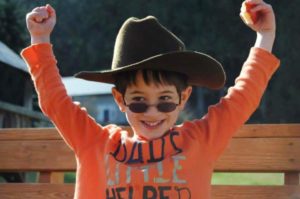Why Pain Makes Apologetics Important
Thank you all for your prayers this past week. People keep coming up and asking how we’re doing, and no matter how many times it happens, I always feel at a loss to answer. To be honest, it still doesn’t feel real yet. The reality of my little brother’s death felt more real while we were waiting in the hospital at his side, than it does now that it has actually happened. Right now, life just feels numb, vaguely wrong, with a tinge of nausea. And it’s real. So terribly real. But as my Dad likes to say, it’s not the ultimate reality.
Sometimes, when we go to Church every Sunday with the same people and listen to the same sorts of sermons, when we read the same Bible verses, and study the same biblical doctrines, theology can get this sort of abstract, ordinary feeling. We so easily forget why we do this. Why we study this. Why we believe what we believe.
And there are many reasons we can remind ourselves of, but this week has made a few especially clear. Why do we study apologetics?
One of the reasons we study apologetics is because we, as Christians, need apologetics. One of the things tragedy does, is smash everything you ever thought was solid. It shows how much of what you believe about something is based on how you feel about something. I thought I had my whole life planned out….and then my little brother dies….and all my priorities are different. My whole-world is turned around; motivations are reversed. Things I never fully appreciated become crucially important. Things I had centered my life around no longer seem to matter. And if your faith is one of those things that is built on a feeling – if what you believe about your state of salvation before God is dependent on whether or not you are having a good day that day – then when (not if, but when) tragedy strikes, you will be without hope.
For a brief time, C.S. Lewis felt this way when his own wife died. He wrote this in his journal, which was later published under the title, A Grief Observed: “I’ve got nothing that I hadn’t bargained for. Of course it is different when the thing happens to oneself, not to others, and in reality, not in imagination. Yes; but should it, for a sane man, make quite such a difference as this? No…The case is too plain. If my house has collapsed at one blow, that is because it was a house of cards. The faith which ‘took these things into account’ was not faith but imagination…If I had really cared, as I thought I did, about the sorrows of the world, I should not have been so overwhelmed when my own sorrow came…I thought I trusted the rope until it mattered whether it bore me. Now it matters, and I find I didn’t.”
He continued: “Bridge-players tell me that there must be some money on the game ‘or else people won’t take it seriously.’ Apparently, it’s like that. Your bid – for God or no God, for a good God or the Cosmic Sadist, for eternal life or nonentity – will not be serious if nothing much is staked on it. And you will never discover how serious it was until the stakes are raised horribly high, until you find that you are playing not for counters or for sixpences but for every penny you have in the world. Nothing less will shake a man – or at any rate a man like me – out of his merely verbal thinking and his merely notional beliefs. He has to be knocked silly before he comes to his senses. Only torture will bring out the truth. Only under torture does he discover it himself.”
By God’s grace, He has kept me from doubt, from despair, from anger. But when tragedy strikes, grief in itself is never easy. People keep coming up and telling us that we seem so strong. That our faith seems so strong. Those words ring strangely in our ears. We are so weak right now…and so broken. And when you have nothing left in this world, the sovereignty and goodness and all the promises of God become the rock you fall on by His grace because everything else has been stripped from under your feet. The stone walls have cracked around you and now the foundation becomes all the more precious. The ice has splintered and the waters are coming up around your head, but you know that He has tread the bottom, and found it good.
The sovereignty of God is a soft pillow for a weary head. The comfort of God becomes truly ultimate, when every other recourse has been tried and found wanting. That is why we need to know not only what we believe, but why we believe, from the basis of Scripture. Because trials try what you believe to be true. Your life becomes staked on what is true – it always was, but pain makes you realize it. What you believe is true in easy times must still be known as true in hard times.
And we study apologetics because this world is hurting and looking for that truth. Isaiah’s story has reached thousands of people by the grace of God – people who are reaching out to us in their pain because they want to know, “What is this hope I can have too?” When you study apologetics, you are not studying some abstract biblical doctrine, or stacking up facts to win a debate. You are immersing yourself in our only hope, so that you can be effectively used by God to give this hope to a lost and hurting world which is screaming for hope.
In times of personal tragedy, people rarely say, “This happened to me, therefore God is not real.” They don’t question the existence of God – they become angry at him. Like C.S. Lewis found in his own life, the danger becomes not so much that this trial will push you into believing that there is no God, but that “thus is God, undeceive yourself.”
The hope we have is true hope in a world of despair. The light we have is true light in a sea of darkness. The salvation we have is a true salvation, in a life of pain. Our good and sovereign Savior does not leave us in sorrow, but He takes our sorrows upon Himself and becomes a man of sorrows.
When you study apologetics, remember the Gospel. The Gospel is the good news in a world that has nothing to offer but bad news. It doesn’t matter if you can defend a young earth, if you can’t explain that this earth is groaning in sin and will one day be redeemed. It doesn’t matter if you can talk about dinosaurs on the ark, if you can’t talk about Christ, the Ark of our Salvation. It doesn’t matter if you can win anyone over in a debate on whether Hell is real, if you can’t tell them the way to Heaven found in Jesus Christ. It does not matter if you can defend the historical resurrection of Christ to anyone on the street, if you can’t tell them how our salvation depends on it. It doesn’t matter if you can tell someone in grief that Jesus loves them, or you’re praying for them, if you can’t also tell them what Jesus did because of His love for sinners or how you, as a sinner, can approach the throne of grace in prayer before a just and holy God.
This world is screaming questions that only Christianity can answer. Apologetics is studying the truth so that you know how to answer. Apologetics is addressing pain in a way that points to the Gospel. Everyone has a story. Everyone has a pain-point they are struggling with. Everyone is broken.
We study apologetics to show people that their story, their pain, their brokenness need not continue forever. Their story need not end here. Christ died to ensure it does not. If I could have taken my brother’s place, suffered and died in his place, I would have, but Isaiah would still have to meet death again one day. I, another sinner just like him, could not take that end from him forever. I could not save him finally or ultimately.
I say I would have done anything so my little brother did not have to die, but I could not do one-one-thousandth of what Christ did for that very thing. Christ suffered and died in place of Isaiah, and now, there is no more death in Isaiah’s future. Isaiah is saved finally, and ultimately. Filled with a greater joy than I can even comprehend or imagine.
Isaiah’s favorite part of The Last Battle from The Chronicles of Narnia, was the very last page, when they leave Narnia and arrive in Aslan’s Country. It says:
“But the things that began to happen after that were so great and beautiful that I cannot write them.
 And for us this is the end of all the stories, and we can most truly say that they all lived happily ever after. But for them it was only the beginning of the real story. All their life in this world and all their
And for us this is the end of all the stories, and we can most truly say that they all lived happily ever after. But for them it was only the beginning of the real story. All their life in this world and all their
adventures in Narnia had only been the cover and the title page: now at last they were beginning Chapter One of the Great Story which no one on earth has read, which goes on forever, in which every chapter is better than the one before.”
When you study and proclaim the doctrines of our faith, you are reading us part of that story. Until He comes again, read on.

It is absolutely lovely to see the glorious gospel of our Lord and Saviour being so exalted by you all. Thank you for sharing this.
“We are weak, but He is strong.” I think I understand that song better today than I did just a couple weeks ago. It’s true: when I realize just how powerless I truly am, I better have a solid foundation. “On Christ, the Solid Rock I stand, All other ground is shifting sand.” I am thankful to God that you and your family have that solid foundation. ❤️